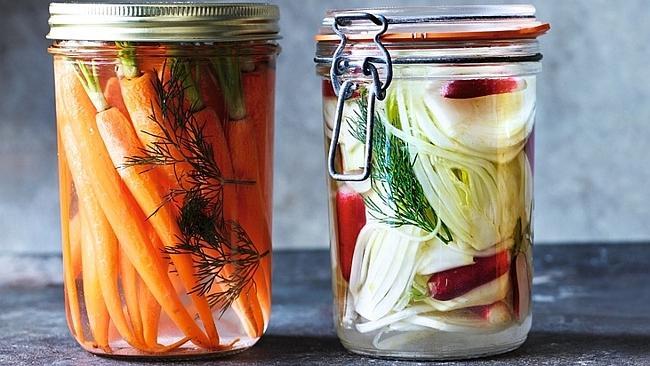Fermented food: join the kimchi, kombucha and sauerkraut craze
Forget specialist coffees and organic wholefoods. Home-made fermented vegetables are the hip thing.

I have just spent an hour of my apportioned time on earth getting intimate with cabbage.
I selected a tender specimen from my greengrocer; I sliced it into ribbons; I massaged it with sea salt; I teased out the juices; I opened the windows to get rid of the cabbagey stench; I apologised to my wife; I packed the cabbage tightly into a jar, along with a few spices; I took a quick iPhone pic, then I left it on a shelf to reach a beautiful decay.
I hate to break it to you, but this makes me about 100 times more fashionable than you. Unless you’re making like a 19th-century German hausfrau with the sauerkraut you’re hopelessly passe. A Kilner jar of fermenting cabbage has eclipsed the spiraliser as the kitchen accessory du jour.
In this month’s issue of Vogue, writer Susie Rushton records a fermentation odyssey that began with her noticing the popularity of kombucha, a Chinese fermented tea with much-vaunted digestive properties, among fashionistas.
On-trend restaurants place great emphasis on pickles and ferments, and their apparent health benefits. At parties, you must reference the “flora” in your stomach and say: “Which way to the loo? I’m just so regular since I got into fermenting!” Meanwhile, the popularity of Asian food is helping to spread the gospel of Korean kimchi (fermented cabbage) and Indonesian tempeh (cultured soybeans).
So culture is the new culture. Though according to Charlotte Pike, author of Fermented — which teaches you how to make these decaying delicacies at home — it’s far from new.
“Many cooks are interested in revisiting forgotten skills and fermentation falls into this category,” Pike says. “It has largely been forgotten by Western culture over the past 50-100 years as food production has become more industrialised. There is also a greater interest in healthy foods and fermented foods are very nutritious. They are a rich source of beneficial bacteria and nutrients that our diets often lack.”
To understand why fermenting has become such an obsession, you need to go back to the godfather of the movement, American Sandor Katz, author of the 2003 pamphlet Wild Fermentation (his more recent book, The Art of Fermentation, is a New York Times bestseller). He got into fermenting in 1993 after he had HIV diagnosed, and credits eating fermented foods for his continued good health, although he is careful to point out that his HIV is still there and he’s alive thanks to medication.
His argument goes a little bit like this. Before refrigeration, fermentation was one of humankind’s most reliable ways of preserving food. What you’re doing with a ferment is using bacteria to “cook” the food, by creating conditions for beneficial bacteria to kill harmful bacteria.
As food processing became more industrialised and controlled, Westerners became more suspicious of bacteria. The only “live” food we eat with any regularity is yoghurt. Katz points out that of the millions of strains of bacteria, only about 1 per cent are harmful to humans.
There are a few more things that help to explain why fermentation has become quite so hip. The time investment is essential to its appeal. It takes two to three weeks for the lactobacillus to turn a jar of salty cabbage into the more-ish delicacy that is sauerkraut. Fermented foods are also reliable markers of cultural sophistication. There’s also that bracing whiff of danger that comes with duelling with botulism and winning.
I watch my jar of greying cabbage shudder and emit a friendly little bubble. It seems so alive. How happy to be a lactobacillus in that jar! No consciousness to be troubled with thoughts of Instagram or impending apocalypse. Just you and your mates fulfilling your biological destiny. We could learn a lot from bacteria, I reckon.


To join the conversation, please log in. Don't have an account? Register
Join the conversation, you are commenting as Logout